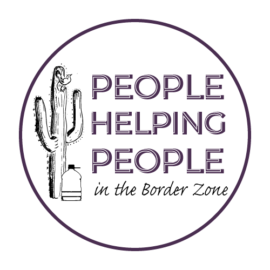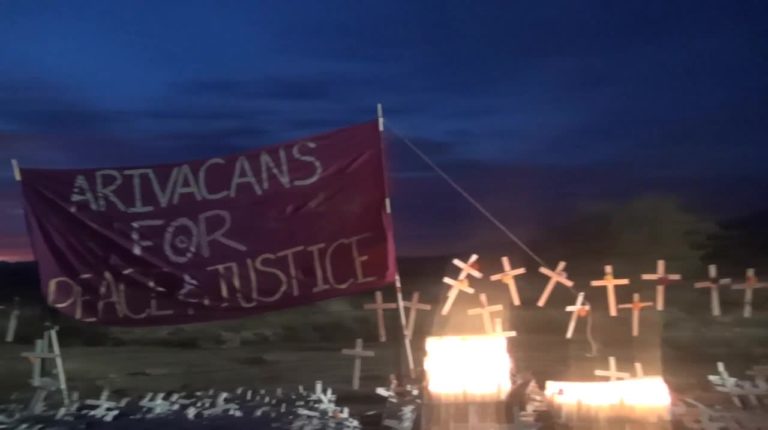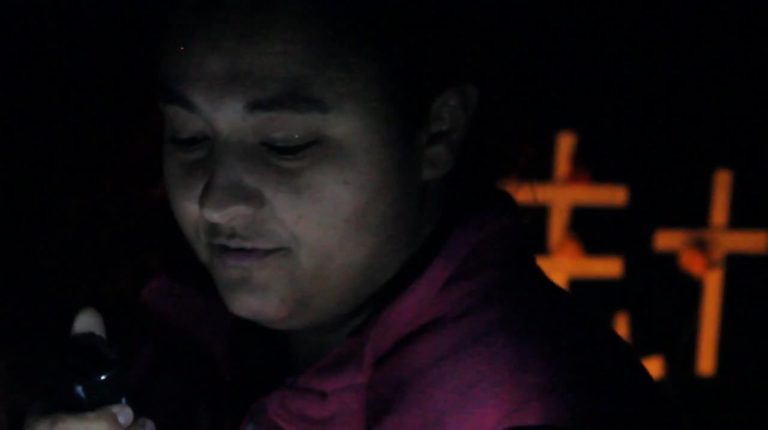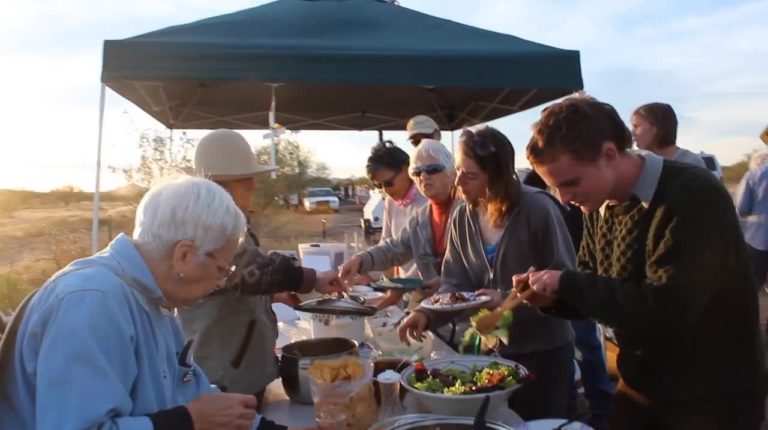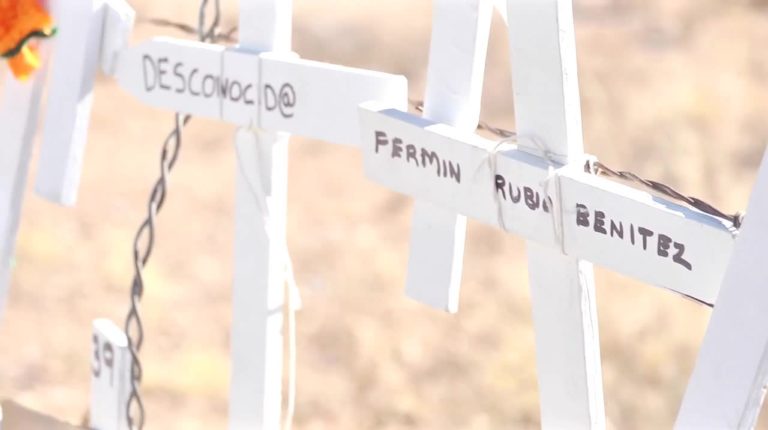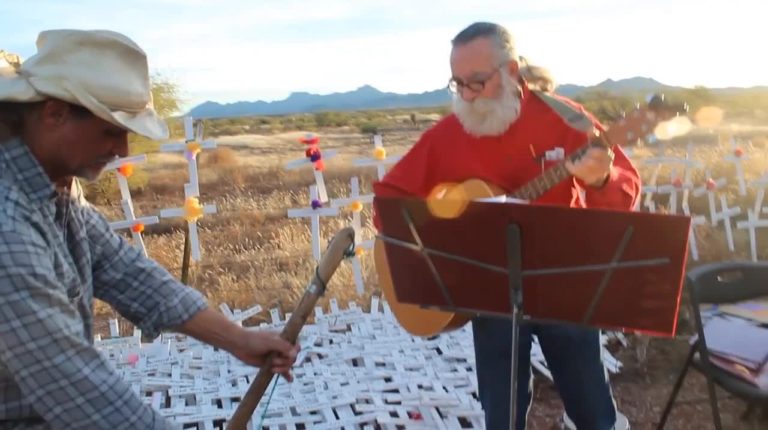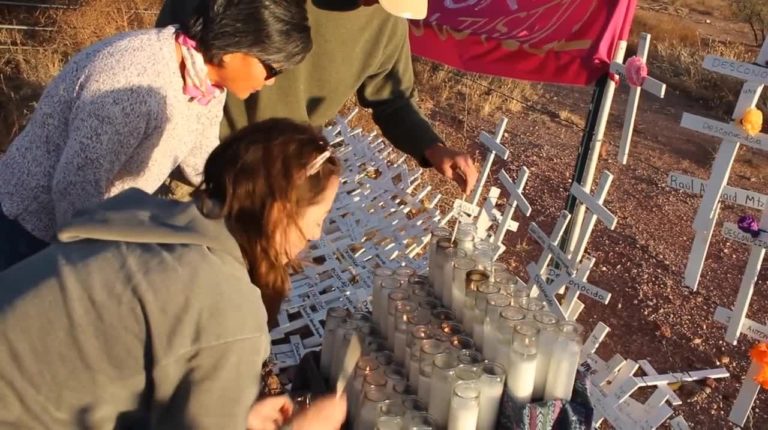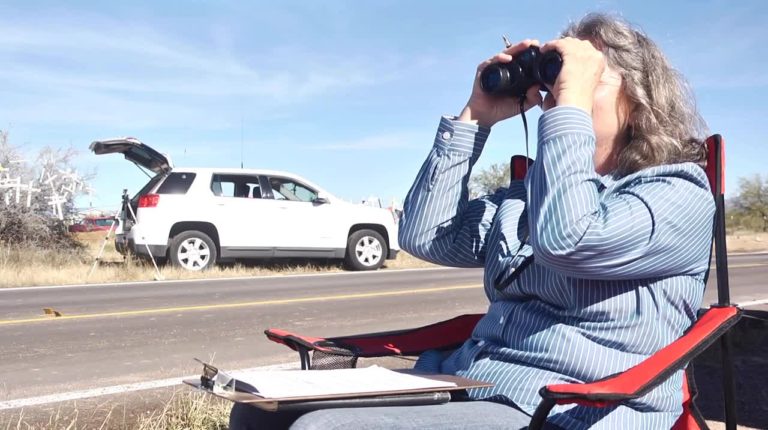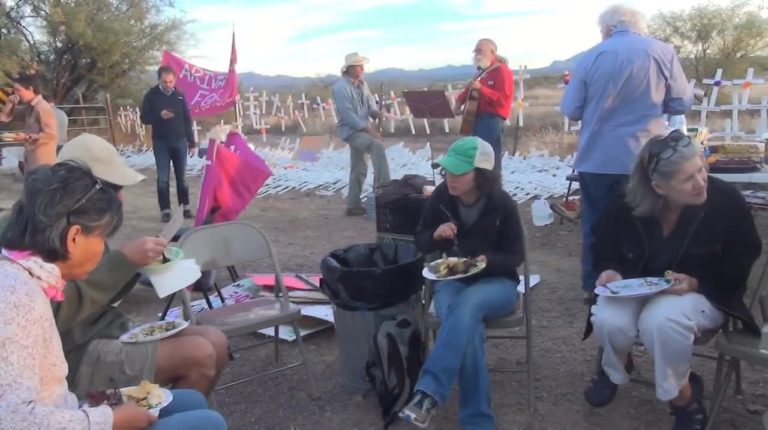ABOUT PHP
WHO WE ARE
WHAT WE DO
HOW TO HELP
Who We Are
We are People Helping People; residents of Arivaca AZ that provide crisis relief + work to demilitarize the border zone, our home.
Founded in 2012, People Helping People in the Border Zone (PHP) is an all-volunteer community organization. We work together for the protection of human life, regardless of immigration status. We organize to stop Border Patrol abuse and the militarization of the borderlands. Consider donating to support our efforts.
Arivaca is located in the eastern Sonoran Desert where the Border Patrol strategy of “Prevention Through Deterrence” pushes migrants and refugees into a deadly crossing. Our community lives in the midst of this crisis of disappearance in the borderlands.
Border enforcement militarization indefinitely occupies our town. Immigration checkpoints on all major roads, helicopters flying low over our homes, and Border Patrol agents armed for war are all around us. Racial profiling, harassment, and intimidation by federal agents are part of our daily lives.
What We Do
From 2012-2021, People Helping People operated the Arivaca Humanitarian Aid Office on the main street in Arivaca. We now work out of a nearby location, Arivaca Borderlands Support, 17236 W. 5th Street. Our mission is to support borderlands residents providing humanitarian aid and crisis relief to prevent death and suffering in the borderlands. The office is staffed by local, trained volunteers.
We work for the abolition of Border Patrol interior checkpoints and the demilitarization of the Borderlands.
We work with No More Deaths to provide food, water, and harm-reduction resources to displaced persons in Sasabe, Sonora.
We work in coalition with other communities in the border zone to work for demilitarization.
We document incidents of harassment or abuse by the US Border Patrol. We are currently working with the American Civil Liberties Union and the No More Deaths Abuse Documentation Team to record these cases.
We have a lending library and other free educational materials, including Know Your Rights information, fact sheets, zines, reports, and more. We also have t-shirts, buttons, stickers, posters, and other items available for a suggested donation.
We host meetings and events for the Arivaca community. If your group is interested in using the space for a meeting or event, please call or email us.
We visit with student and other progressive groups touring the borderlands who want to learn about the perspective of rural residents. Contact us at phparivaca@gmail.com if you are interested in scheduling a visit.
We receive material and monetary donations. We are always in need of resources. Purchase through our Amazon wishlist or view a list of items in the most demand. You may make a monetary donation in person in the aid office, by mail, or online. Checks can be made payable to “People Helping People/AFGJ.” and mailed to People Helping People, PO Box 826 Arivaca, AZ 85601. All donations are go directly to support the community organizing efforts and for humanitarian aid.
Ajo Samaritans, No More Deaths, People Helping People in the Border Zone
All actions taken under the auspices of the Ajo Samaritans, No More Deaths, and People Helping People in the Border Zone are with concern for the lives, well-being, and dignity of all people in the borderlands. Our work is humanitarian relief, which includes the provision of water, food, respite, medical care, family reunification, search and rescue/recovery services, emotional first aid, legal resources, and other necessities that prevent exposure to further harm. Our efforts to provide care are based on need alone and are regardless of an individual’s immigration status. We are individuals acting out of moral conscience. Our work is civilian, non-governmental, nonviolent, voluntary, and community-based.
US government policy has fueled a humanitarian crisis in the southwest borderlands. The Department of Homeland Security’s militarized approach to border security has led to massive civilian casualties. Inside of the United States, there have been tens of thousands of documented deaths and disappearances over the last twenty years. The build-up of border walls and enforcement operations is ongoing, as is systemic nonresponse to the humanitarian crisis on the part of government actors. As a result, civilian response is necessary as local residents and volunteers frequently encounter people in need. In the absence of government action to reverse the policies and practices that cause mass death and suffering in the border region, humanitarian efforts are a civil society mandate.
In all of our work, the humanitarian imperative comes first. We work in accordance with the International Committee on the Red Cross’ principle that “relief aid must strive to reduce future vulnerabilities to disaster as well as meeting basic needs.” Humanitarian relief is therefore both a matter of handing a dehydrated person water and of preventing further exposure to extraordinary threats to life and safety once individuals have regained a measure of health and well-being.
We stand firm that all of the provisions of humanitarian relief are rooted in a moral and legal foundation, and supported by international standards. Our mission to end death and suffering in the US Borderlands is guided by these principles. In our collaborations to protect life and health in the region, we recognize that all people who cross the southern border are human beings deserving of basic dignity. We work to support the right to life, liberty, and security of persons as guaranteed by the Universal Declaration of Human Rights. In accordance with the principles of humanity, neutrality, impartiality and independence, we act to uphold the United Nations OCHA mandate that all humanitarian action be provided independent from political and military objectives. US law upholds this principle of independence: as civilians, there is no obligation under US law to report violations of law to authorities including known immigration violations. We are unarmed in accordance with International Humanitarian Law, and distinguish ourselves from law enforcement and all armed presence in the region.
We recognize that those we serve often do not have legal immigration status or authorization to enter the country. Some may have a pathway to gain status, while others would have their claims denied by the immigration legal system. We reject the notion that some people are “less deserving” of care based on their motivations for crossing or vulnerabilities. The type of care we provide is determined by the varied needs of individuals. Therefore, we operate under the principle of consent. We will only move forward with humanitarian interventions with the informed permission of those whom we serve. We do not promote any particular course of action. Rather, through the delivery of care, resources, and information, we honor and support the autonomy of individuals to more safely navigate their own circumstances.
Extraordinary Threats to Life and Safety
People crossing the US borderlands in remote areas face extraordinary threats to life and safety. These threats include, but are not limited to:
~Threats to Basic Needs and Orientation~
Disorientation includes lack of familiarity with remote and foreign environments, landscape, and terrain or how to access civilization or emergency services. Disorientation may be caused by
- Travel through unknown and challenging terrain and being unable to navigate to safety or to direct rescue resources to their location.
- Having become injured, ill or otherwise unable to keep up with traveling companions, or being accidentally or intentionally left behind.
- Having been given false or misleading information regarding the landscape and distances of anticipated travel.
- Having been chased and scattered by Border Patrol’s attempts at apprehension thus losing travel companions and life-saving supplies in the process.
Lack of access to potable water for hours or days at a time in remote areas, causing dehydration and associated illnesses. Lack of access to needed quantities of drinking water may be caused by:
- Prolonged exposure to extreme temperatures in remote environments.
- The pervasive inability to carry enough water to support survival during remote and prolonged travel.
- Drinking from contaminated water sources in remote areas, such as cattle tanks, ponds, and wildlife guzzlers, in order to survive.
Lack of access to food for hours or days at a time, causing extreme hunger and/or malnutrition.
Sleep deprivation which may be caused by acute stress and/or nighttime travel.
Extended physical exertion resulting in debilitating exhaustion.
The likelihood of continued travel in remote environments without adequate supplies and geographic orientation to support survival, and/or when one’s health and well-being are already compromised.
~Medical Threats~
Environmental exposure to extreme temperature and temperature variations. Exposure to prolonged high heat and direct sunlight resulting in dehydration and heat-related illnesses. Exposure to prolonged cold temperatures, rain, snow, and severe storm conditions, resulting in cold related illnesses.
Injuries and pain that compromise mobility such as sprains, strains, fractures, blisters, muscle cramping, musculoskeletal soreness and pain, head, neck and back pain or injury, eye injury, etc.
Illnesses acquired during travel and worsened by a depressed immune system function such as gastrointestinal illness from dirty water or lack of water and food causing nausea, vomiting, and diarrhea. Urinary system illness and kidney damage presenting as lack of urination, blood in the urine, and pain with urination. Chest pain and/or shortness of breath due to excessive strain on the heart and lungs. Fever, unremitting severe headache, respiratory system depression, and infections due to untreated cold/flu. All symptoms related to cold/heat-related illnesses.
The exacerbation of pre-existing medical conditions due to elevated risk present in dangerous environments such as high blood pressure, a history of heart disease, a history of seizures, history of kidney problems, history of chronic lung disease, allergic reactions, pregnancy, diabetes, and the state of being very young or very old. Further potential for exacerbation due to lack of access to medication.
Changes to mental status, confusion, lethargy, inability to speak or answer questions appropriately due to the effects of physical, psychological or emotional trauma, cold/heat related illness or any other extraordinary threat listed here.
Dangerous animal bites and stings such as snake bites, scorpion sting, dog bites, and a lack of access to treatment.
~Threats of Violence~
Assault by human traffickers, civilian militias, traveling companions, Border Patrol and/or law enforcement, military and other government agents.
Extortion: financial demands by organized crime circuits may be reinforced by death threats to persons and family members.
Coercion: being subjected to the threat or use of force as a form of persuasion and control. Coercion may also exacerbate past histories of abuse.
Trafficking: being bought and sold into forced work arrangements.
Kidnapping and/or forced confinement by traffickers, organized crime circuits, civilian militias, and/or other actors.
The threat of violence and/or death if returned to their countries of origin.
While the above threats of violence apply to all, some populations face a heightened risk of exposure when undergoing multi-day journeys through remote environments including but not limited to unaccompanied minors, women, the disabled, and the elderly.
~Barriers to Emergency Services~
Distressed people attempting to cross through the US borderlands face extraordinary barriers to accessing Emergency Medical Services (EMS), such as ambulance services, definitive care at nearby hospitals and Search and Rescue/Recovery (SAR/R) resources while in life-threatening emergencies. These barriers include, but are not limited to:
An inability to report emergencies due to traveling in remote areas without access to cell phones or where cell phone service is absent or unreliable, and cell phone battery life is insufficient to make or maintain contact with emergency assistance.
An inability to determine the location of one’s emergency due to 1) distressed persons’ lack of familiarity with foreign and remote environments and 2) to the limited capacity of cell phone-tracing technology among 911 dispatch to extract locational information from foreign-bought devices and in areas without sufficient cell phone signal to allow for triangulation.
A discriminatory 911 dispatch system: as a border-wide practice, county 911 dispatchers forward distress calls from perceived border crossers directly to Border Patrol (BP) and away from local Search, Rescue, and Recovery services that respond to distress calls from perceived citizens. Routing all emergency calls to a border enforcement-priority agency causes multiple barriers to accessing robust, timely, and universal emergency services:
- The mobilization of BP agents in the place of EMS during medical emergencies: while BP may re-activate the 911 system and request an ambulance after making contact with a patient, this is done by the discretion of BP agents in the field who are tasked with prioritizing law enforcement rather than medical treatment.
- The mobilization of BP in the place of traditional SARR resources otherwise available through Sheriff’s Departments or auxiliary governmental organizations severely limits the access to dedicated rescue resources on a given emergency case. BP’s responsiveness to search, rescue, and recovery requests is limited due to their prioritization of border enforcement activities. As a direct result, many distressed people receive diminished governmental SARR efforts, or no rescue mobilization at all.
Fear of accessing emergency services that involve immigration enforcement for self: Border Patrol involvement in emergency services results in the apprehension, detention, and eventual deportation following rescue or medical treatment of individuals in distress. The involvement of immigration enforcement agents in emergency services thus deters many from accessing EMS, SARR, and hospital resources. Such immigration-enforcement barriers to accessing emergency services include:
- Fear of abuse from responding immigration enforcement agents
- Fear of return to one’s country of origin
- Being subject to prolonged detention
- Enduring family separation
- Denial of medical treatment
- Denial of access to medication during detention
Due to these deterrents to reporting emergencies, many distressed people neither attempt nor consent to calling 911, even when in life-threatening danger.
Fear of contacting emergency services that involve law enforcement for others. Those traveling through the remote borderlands may be the sole reporting party for a medical emergency, a known missing person, and/or for the known location of human remains in a remote area. There are no legal protections for undocumented persons wishing to report such emergencies to governmental entities. It follows that reporting parties face extraordinary threats of detention and deportation for themselves if they attempt to report the emergency of another.
~Psychological Threats~
Psychological trauma: threats to life and safety commonly lead to traumatic shock and/or acute stress. These conditions may compromise an individual’s ability to make decisions in the best interest of one’s own safety and survival. Psychological trauma may have mental, emotional, spiritual, and/or physical dimensions and manifestations. Causes of psychological trauma may include:
- Becoming lost or separated from traveling companions
- Family separation
- Falls, injuries, and other accidents
- Enduring prolonged hunger and thirst
- Surviving or witnessing violence including physical or sexual assault
- Being threatened, extorted, or coerced with threat of violence
- Surviving a near-death experience
- Witnessing the death of a loved one or traveling companion
- Encountering human remains
- Provocation by extreme conditions of previously existing mental health challenges and/or past traumatic experiences
Provisions of Humanitarian Relief
The humanitarian relief we provide seeks to mitigate the extraordinary threats to life and safety faced by people crossing through the US borderlands. The provisions of humanitarian relief includes but are not limited to:
- Water, electrolytes, and re-hydration assistance
- Food and re-nourishment
- Clothing, footwear, blankets
- Personal hygiene care and supplies
- Respite and recovery from dangerous exposure to the elements and experienced hardships
- Medical assessment, care, and advocacy with the support and oversight of medically trained volunteers. Based on the assessment, we collaborate with the individuals in need to provide medical support including: contacting emergency medical services, supporting access to care at area hospitals, clinics, and temporary and established relief stations, and providing medical care in the field.
- Assessment and medical care for psychological trauma and acute stress
- Support for individuals’ religious and spiritual practices.
- Access to the American Red Cross Restoring Family Links Program. This Red Cross initiative helps reestablish contact between loved ones separated by conflict, disaster, or migration. The program provides free and confidential phone services at relief centers around the world.
- Intake interviews about missing persons who may be lost or deceased in remote areas and mobilization of Search, Rescue, and Recovery efforts as needed be they humanitarian, governmental and/or family-led.
- Documentation of abuses committed by governmental and nongovernmental actors.
- Legal resources, such as:
- Information about legal rights in the United States
- Consulate services and contact numbers
- General information about the requirements for asylum or visas
- and access to consultation with immigration attorneys
- Information about the process of immigration arrest and detention
- Information about how to search for individuals in immigration detention facilities including missing family members and loved ones
- Information and support for individuals who choose to turn themselves in to immigration custody by contacting US Border Patrol and providing witnessing and advocacy during the apprehension process
- Information and support for individuals who wish to return to their country of origin either through the US Border Patrol or on their own.
- Harm reduction resources to promote survival and wellness when the likelihood of continued travel in remote areas exists , such as
- Water filtration and purification systems and other wilderness survival resources
- Information about accessing emergency medical and rescue services
- Information about how to orient oneself to the area including description of major geographical landmarks, cardinal directions, infrastructure, how to find help and how to direct emergency and rescue resources to one’s location.
- Emergency mobile phone services to promote access to rescue services.
PHP works in coalition with other communities in the border zone to work for demilitarization.
On May 27, 2015, we held a joint day of action with border communities across southern Arizona, including Ajo, Bisbee, Nogales, Patagonia, Sierra Vista, and the Tohono O’odham Nation.
As Arivaca residents, we have been organizing for the demilitarization of the borderlands. We believe that only the protection of human life and investment in our communities can transform the border crisis. We call for an end to the military approach to immigration policy. We believe in human rights and dignity for all.
To uphold this vision, we call for the immediate removal of all inland Border Patrol checkpoints. Checkpoints surround our community. We cannot leave to attend school, go to work, or visit with friends and family elsewhere without being stopped by armed Border Patrol agents. We are asked to verify our citizenship and are at times subjected to questioning, profiling, warrantless searches, verbal harassment, and physical abuse by Border Patrol agents.
By placing checkpoints on all roads between 25 and 100 miles into the US interior, migrants and refugees are forced into long journeys on foot through the Sonoran Desert. Checkpoints not only lock down our communities–they directly contribute to the documented deaths and disappearances of thousands of people across the southwest borderlands.
As a community, we have petitioned the US Border Patrol to abolish all interior checkpoints.
We independently monitor Border Patrol checkpoints to deter abuse and collect data. Read our Checkpoint Monitoring Report.
We hold vigils and protests at area checkpoints, calling for their immediate removal.
In partnership with the American Civil Liberties Union, we have taken legal action again the violation of our right to monitor Border Patrol’s activities at the checkpoints. We have also helped to provide testimony about the harassment and abuse of border residents at checkpoints.
Subscribe to our Google Calendar to be updated when PHP adds events!
How To Help
We can all do our part to provide direct humanitarian aid to help protect the lives of those in danger in the militarized borderlands. If you need assistance providing aid to people in distress, contact our office at 520-398-3093 and be sure to leave a message. This is not an emergency hotline, response time depends on volunteer capacity.
Donate materials! Check out our Amazon Wishlist for the most up-to-date needed items that are linked to automatically ship to us or use the list below for items always in high demand. Please ship any supplies to People Helping People, PO Box 826 Arivaca, AZ 85601.
Contact us at phparivaca@gmail.com or 520-398-3093 if you are interested in getting trained.
Arrange a fundraiser or speaking event at your college or in your community! PHP members are available to travel to give presentations about our work in the borderlands.
We request an honorarium to support our continued efforts in the community. Contact us at phparivaca@gmail.com if you are interested in arranging a talk.
